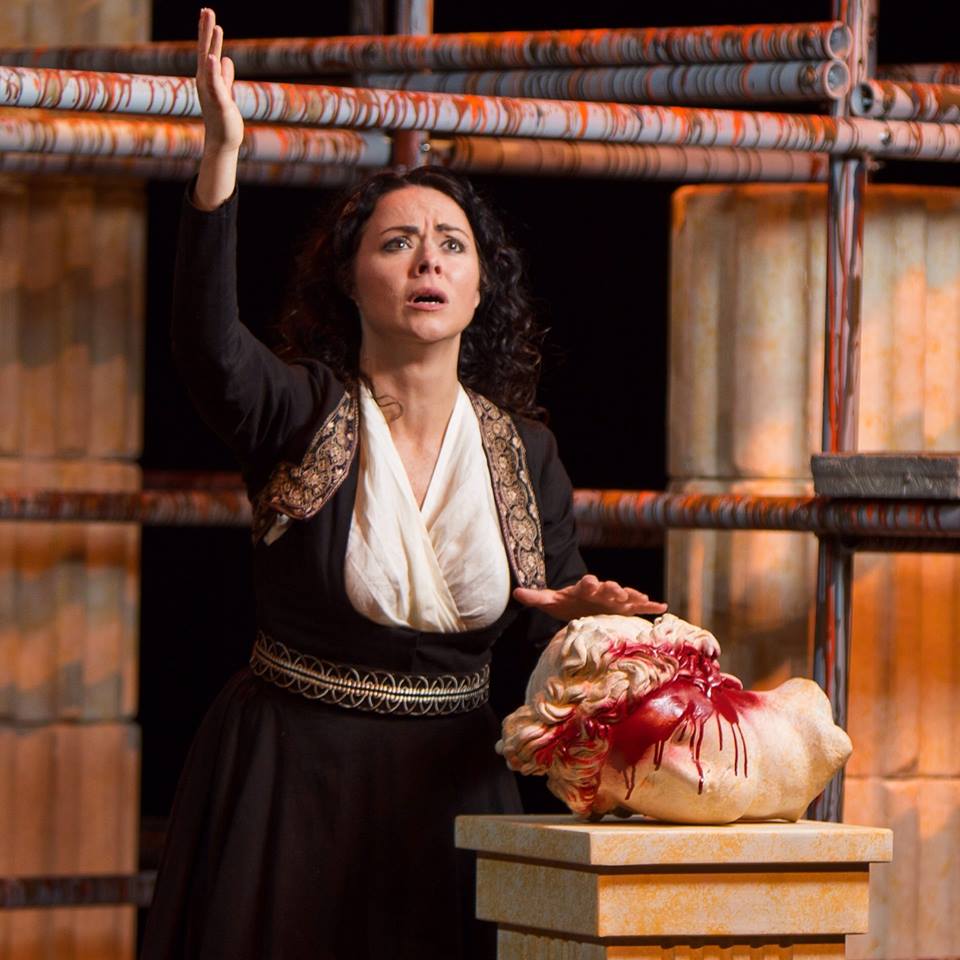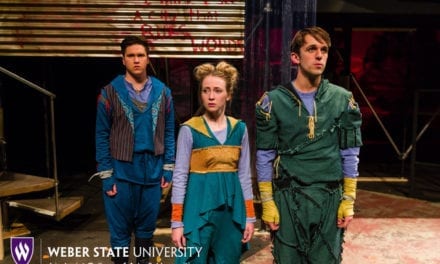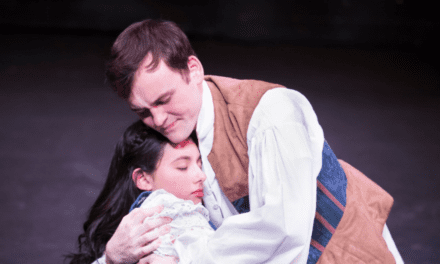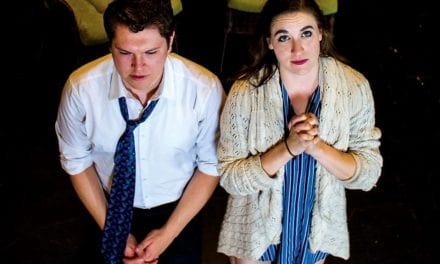SALT LAKE CITY — Written by Sophocles around 411 BC, Electra is a Greek tragedy that proved 2,400 years ago that yes, female protagonists can indeed carry a show. (Take that, Hollywood.) And though the genre “Greek tragedy” isn’t one that we typically see much of here in Utah, as a combined literary and theatre geek myself, I was thrilled to have the opportunity to review the Classic Greek Theatre Festival and Westminster College Theatre Department’s co-production. However, though I have in fact read a translation of Electra back in the day (I was an English major), it’s been a while, and I wasn’t sure how easy-to-follow the play would be, so I did a little prep-work the night before by looking up the basic plot online.
There was no need, thanks to a fabulous translation by Marianne McDonald and J. Michael Walton which took the “ancient” out of the Greek and left an American English Electra that was both modern and easy-to-understand. McDonald and Walton’s translation maintained Sophocles’ literary integrity by keeping it in verse rather than prose, writing tight and interesting phrasing, and preserving humor and wit as an undercurrent even during tragedy. Producer/Artistic Director Jim Svendsen and Director L.L. West started off right simply by choosing this Electra translation over dozens of others—as the script entertained as a play and never felt “academic,” allowing the actors to perform rather than attempt to simply present a classical thesis.
For those without my paranoid Google searches, the basic plot of Sophocles’ Electra follows the fiery Electra, whose presence on-stage and in-script makes up a vast majority of the play. Electra remains obsessed with plotting revenge for her father, Agamemnon’s, brutal murder, carried out years before by her own mother, Clytemnestra, and her mother’s lover, Aegisthus. As a result of this murder, Electra has become a prisoner in her own home and anxiously awaits the arrival of her brother, Orestes, whom Electra originally sent away to be raised by a trusted friend of her late father’s. Orestes is to be Electra’s salvation and the means to fulfill her long-awaited revenge.
Thrown ambivalently into the mix is another sister, Chrysothemis, who basically bows down to authority while secretly (but cowardly) sympathizing with Electra. The play unfolds as Electra rants on, Orestes returns unbeknownst to Electra with his Tutor and sidekick Pylades—who (played by Abby Scott) takes up the drums for the remainder of Director West’s version (in Sophocles’ play, Pylades remains mute; and in Ancient Greece, music and drumming was usually a part of plays). A Greek chorus of three women weave in and out of the stage and occasionally serve as Electra’s friends or simply narrators. The play unfolds with themes ranging from justice, irony, humor in tragedy, and the burdens of fate and revenge—all in a story that is compelling, relatable, though admittedly a bit horrifying in the details. (It is Greek tragedy, after all.)
Given even the best possible director and the best script, without solid actors, you’ve still got a flop. Luckily, this play has solid actors. The key to Electra is of course, the title heroine played by Melanie Nelson. Electra is on-stage most of the show and drives the dialog and action, and Nelson was more than up to the challenge. Nelson’s Electra was full of fury, anger, and hatred for her oppressors and her father’s cause—and yet at the same time, her Electra had moments of softness, love, and honesty. In order for this play—which hinges on Electra—to be palpable, the audience must like Electra, and in my opinion, Nelson created an Electra that was so open-hearted and real that despite her loudness and her blatant obsessiveness (and probable dance with madness), I couldn’t as an audience member help but love her. Two defining moments stood out to me, both when Electra confronted other characters: first in her one-on-one exchange with her enemy, her mother, Clytemnestra. Second, in the scene in which Electra is finally reunited with her brother, Orestes.
In the first scene, Nelson’s Electra is on edge and is fully exposed emotionally; she is tense, speaks loudly, and is prone to overreaction. Nelson’s posture is unkempt and unfixed—like an untamed tempest. In contrast to this, Clytemnestra (played by Barbara Smith) regally presents herself as all that is Ancient Greece, in formal dress (with a beautiful traditional white and gold over-the-the-shoulder robe by Costume designer Erin M. West), formal speech, and formal expressions. Only after beginning their argument do Smith’s walls of formality begin to crumble and does she begin to act a little more petty—taking a low blow here, a snarky look there—but truly what is fascinating in this scene is watching the action and reaction between these two great actresses. Though there are no weapons fired but words, a battle of emotions and justifications are thrown and it is enthralling to watch.
The second scene, in which Electra and Orestes (played by Max Huftalin) finally share the stage, couldn’t be more different than the mother-daughter skirmish described above. At first, Huftalin’s Orestes is pretending to be someone else, and as such, Nelson’s Electra is treating him with disregard and even disgust. The change that takes place, however, when the truth is revealed that he is—in fact—her lost brother is so dramatic and so complete that it is both thrilling and quite frankly, hilarious. The actors play-up the moments well as miscommunication, misleading, and a sweet reunion encompass so many emotions into one relatively short scene.
One thing I loved about the director’s casting and direction here (and I’m sure artistic director Jim Svendsen and assistant director Emilio Casillas had a lot to do with this as well) is how movingly Electra and Orestes contrasted and complemented each other. Nelson’s Electra is dark and brooding—in dress, looks, and manner; everything for Electra is big and dramatic and extreme. Huftalin’s Orestes, however, is the exact opposite—he is light, sarcastic, and doesn’t take much of anything too seriously, at least not on the surface. He is the comic relief to the overwhelming drama of Electra; the light to her dark; the frothy whip to her dense cocoa. Her intensity is an urgent, driving force—and he will be her weapon, if she wills it, but he also is someone to finally steady her. And in this scene, it is beautiful to see how these two actors so perfectly show how this brother and sister complete one another and how being apart all these years was a big part of the mourning Electra felt.
I literally could go on and on about this show, because it is one that was thoughtfully put together and it showed—including the set design by Spencer Brown, mixing classic and modern by having classic columns, half broken, marked with blood-red graffiti (all of Greek symbols), and surrounded by scaffolding. A short column with an overturned, blood-red paint smeared bust on top served as the ceremonial altar for the play (as there are of course prayers to the Greek gods).
The costume design reflected the director’s decision to “[expand] the time period a bit—well some 2,400 years . . . a spanning of time from ancient to modern” (from the “Director’s Notes” in the Electra Program). Thus, West had the heavy task to costume a cast of ten characters (including the chorus of three) in Greek styles that embraced ancient to modern styles. Somehow West accomplished this—starting with Clytemnestra’s decisively ancient dress, which West herself describes in the program as a conscientious costume choice to appear as though Clytemnestra “presents herself visually in a classic, proper manner . . . to justify her incongruous behavior.” Then there’s Electra’s very dark, mostly black, yet traditional folk costume which West describes as “grounded, comfortable, and practical,” suggesting Electra’s attempts to hold onto her “family traditions.” The rest of the cast is a mix of the most modern (with the chorus women wearing varying eras of the last century’s clothes and Aegisthus, the hated lover, appearing in a tight-cut and totally out-of-place suit) and traditional elements, with military elements thrown in for Orestes and Tutor.
Classical Greek Theatre Festival and Westminster College’s Electra is a bloody, thrilling, psychological, moving treatise on justice, religion, revenge, and family. Yet somehow—in all of these heavy themes—it has moments of real comedy, quirkiness, and fun, with actors who are willing to not take themselves too seriously. This show is a must-see for Utah theatre lovers. Greek tragedies aren’t typically on most theatre company’s rosters (nor are likely to be anytime soon), so catching Sophocles’ Electra on stage—and at this level of professionalism and creativity—is a rare treat indeed. To put it bluntly, this show is a must-see. Electra’s sister Chrysothemis put it best: “Yea, when a thing is right, it is not well/ Idly to wrangle, but to act with speed.” Only a few short weeks remain. So put on your speed already—and SEE THIS PLAY!






